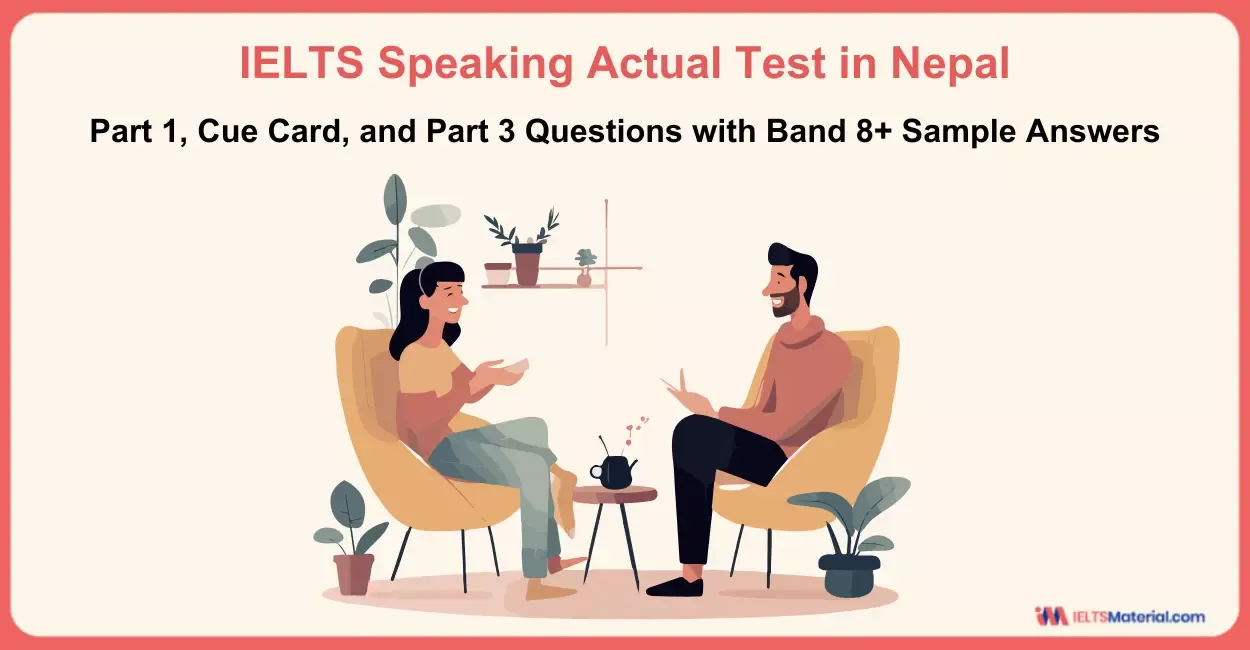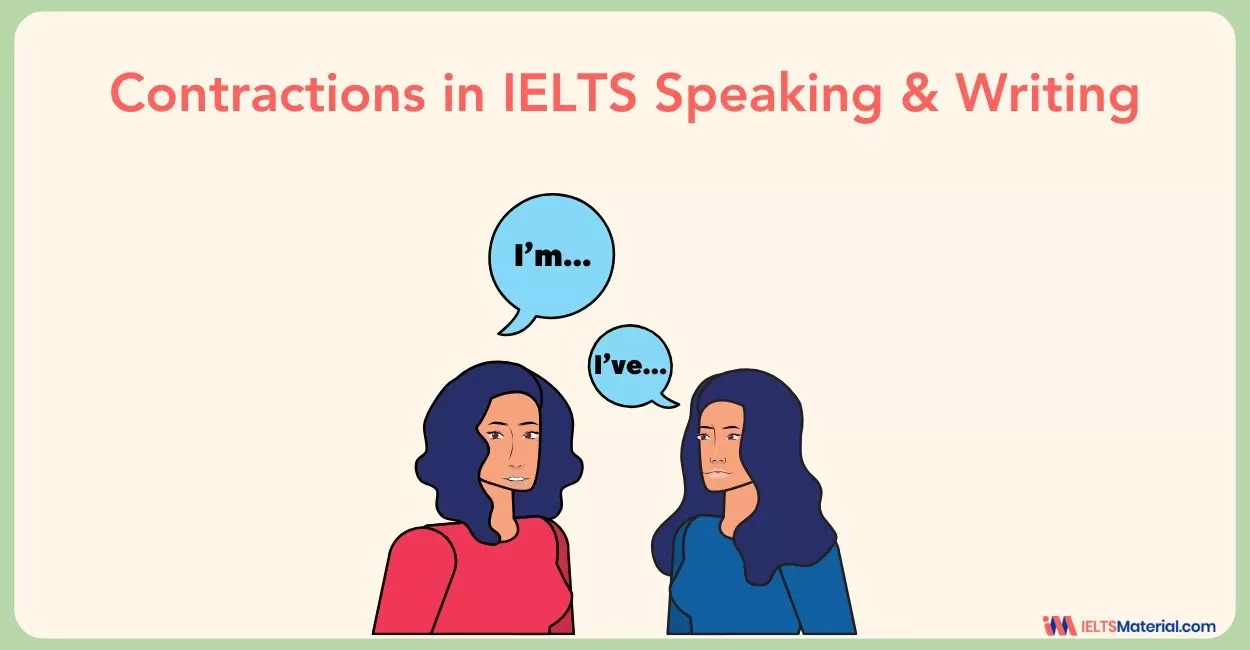Using Contractions in IELTS Speaking and Writing
8 min read
Updated On
-
Copy link
Contraction refers to a phrase or word that has been shortened by removing one or more letters and replaced by an apostrophe. Learn the common list of contractions with examples, how to use them in IELTS Speaking, and whether you can use them in writing.
Table of Contents

Limited-Time Offer : Access a FREE 10-Day IELTS Study Plan!
‘Can I use contractions in IELTS Speaking and Writing?’ is a common question that confuses most IELTS candidates. While contractions are a natural part of spoken English, they should be used strategically depending on the task type. So, besides knowing what contractions are and how to use them appropriately, you should also understand what IELTS examiners look for in the speaking test as well as in the writing module.
Therefore, in this blog, let us explore common contractions, when to use or avoid them, and tips to sound fluent and appropriate.
What are Contractions?
Contractions are combinations of words where certain letters are omitted and replaced with an apostrophe (’), making speech or writing more fluid and less repetitive. They are commonly used in informal writing and casual conversations.
Contractions tend to simplify the language, and people often use them to speak English quickly and more clearly. Since contractions are used everywhere in English, particularly in conversational or informal language, knowing various examples and their meanings is essential.
Why Contractions Matter in IELTS?
In the IELTS exam, language naturalness, fluency, and appropriate tone are essential for achieving a high band score. One often-overlooked aspect of English fluency is the use of contractions. Understanding when and how to use contractions can make a significant difference, especially in IELTS Speaking and certain parts of the IELTS Writing exam.
Using contractions correctly and appropriately can:
- Make your speech sound more natural and fluent.
- Demonstrate your command of everyday English.
- Show tone awareness in writing.
Join our band 9 IELTS trainers today and crack IELTS in no time!
Book a FREE IELTS Demo
List of Commonly Used Contractions in IELTS Speaking
The most common contractions are ‘I’m’, ‘I’ve’, ‘I’ll’, etc. In the tables below, we will go through the lists of more such common contraction types relevant to IELTS contexts.
Contractions with ‘To Be’
These contractions are formed by combining pronouns with the verb to be.
|
Contraction |
Full Form |
Example Sentence |
|---|---|---|
|
I’m |
I am |
I’m really excited about the new project. |
|
You’re |
You are |
You’re absolutely right about that issue. |
|
He’s |
He is |
He’s working on a new design. |
|
She’s |
She is |
She’s going to attend the seminar tomorrow. |
|
It’s |
It is |
It’s been a challenging but rewarding year. |
|
We’re |
We are |
We’re planning a holiday next month. |
|
They’re |
They are |
They’re always ready to help. |
Contractions with ‘Will’
These contractions are formed by combining pronouns with the verb ‘will’, expressing future intentions or decisions.
|
Contraction |
Full Form |
Example Sentence |
|---|---|---|
|
I’ll |
I will |
I’ll join the meeting after lunch. |
|
He’ll |
He will |
He’ll probably finish the report by Friday. |
|
We’ll |
We will |
We’ll discuss it tomorrow. |
|
They’ll |
They will |
They’ll be here by 5 p.m. |
Contractions with ‘To Have’
These contractions are formed by combining pronouns with the verb ‘have’, used for forming present perfect tenses.
|
Contraction |
Full Form |
Example Sentence |
|---|---|---|
|
I’ve |
I have |
I’ve seen that movie already. |
|
You’ve |
You have |
You’ve made a solid point. |
|
They’ve |
They have |
They’ve completed all the tasks. |
|
We’ve |
We have |
We’ve been friends since school. |
Contractions with ‘Would’ or ‘Had’
Some contractions can mean either ‘would’ or ‘had’, context helps determine the meaning.
|
Contraction |
Full Form |
Example Sentence |
|---|---|---|
|
I’d |
I would/I had |
I’d love to attend. / I’d already eaten. |
|
He’d |
He would/He had |
He’d joined us if he had time. |
|
She’d |
She would/She had |
She’d been there before. |
|
We’d |
We would/We had |
We’d never visited that city. |
Contractions with ‘Not’
These negative contractions make speech more fluent and less formal.
|
Contraction |
Full Form |
Example Sentence |
|---|---|---|
|
Don’t |
Do not |
I don’t agree with that idea. |
|
Can’t |
Cannot |
We can’t ignore the issue anymore. |
|
Isn’t |
Is not |
It isn’t working the way it should. |
|
Didn’t |
Did not |
He didn’t attend the session. |
|
Wouldn’t |
Would not |
I wouldn’t recommend that method. |
|
Shouldn’t |
Should not |
You shouldn’t worry too much. |
Informal Contractions
In casual speech, you might hear highly informal contractions that are not appropriate for IELTS writing and should be used cautiously in speaking. These forms sound overly casual. While ‘gonna’ or ‘wanna’ may be fine in IELTS Speaking Part 1, overusing them can harm your impression in Part 3, where deeper, more structured language is expected.
|
Informal Contractions |
Full Form |
Example Sentence |
IELTS Usage |
|---|---|---|---|
|
Gonna |
Going to |
I’m gonna try that soon. |
|
|
Wanna |
Want to |
Do you wanna come with me? |
|
|
Gotta |
Got to |
I’ve gotta go now. |
|
|
Shoulda |
Should have |
I shoulda done more practice. |
|
|
Coulda |
Could have |
I coulda taken the train. |
|
|
Woulda |
Would have |
I woulda helped if I could. |
|
Using Contractions in IELTS Speaking with Examples
In the IELTS Speaking test, examiners assess fluency and coherence, pronunciation, lexical resource, and grammatical range and accuracy. Therefore, using contractions helps you sound more fluent and native-like, maintain a natural rhythm and intonation, and avoid sounding too stiff or robotic. Let’s check out some examples.
IELTS Speaking Part 1 – Personal Information and Everyday Topics
These are casual, familiar topics, so contractions are perfectly suitable and expected.
|
Question |
Without Contraction |
With Contraction |
|---|---|---|
|
What do you do? |
I am a teacher. |
I’m a teacher. |
|
Do you like your hometown? |
I do not really enjoy it. |
I don’t really enjoy it. |
|
Do you often go to the cinema? |
I have not been in a while. |
I haven’t been in a while. |
IELTS Speaking Part 2 – Long Turn
You are expected to speak continuously for up to 2 minutes, so fluency is crucial. Contractions help reduce repetition and improve the flow.
Cue Card Topic: Describe a book you have recently read.
|
Without Contractions |
With Contractions |
|---|---|
|
I am going to talk about a novel I have read recently. |
I’m going to talk about a novel I’ve read recently. |
|
It is about a young detective who cannot solve a case. |
It’s about a young detective who can’t solve a case. |
|
I would recommend it to anyone who enjoys mysteries. |
I’d recommend it to anyone who enjoys mysteries. |
IELTS Speaking Part 3 – Abstract Discussion
Part 3 requires more thoughtful, extended answers. While slightly more formal than Parts 1 and 2, contractions are still appropriate and expected, especially when used naturally. Even in more analytical discussions, contractions maintain a conversational tone that is key for good fluency and coherence.
Sample Topic: Why do people enjoy traveling?
|
Without Contractions |
With Contractions |
|---|---|
|
People do not want to stay in the same place. |
People don’t want to stay in the same place. |
|
They have always looked for new experiences. |
They’ve always looked for new experiences. |
|
I cannot say for sure, but I believe it is human nature. |
I can’t say for sure, but I believe it’s human nature. |
Book a FREE online webinar with our IELTS experts to learn vocabulary tips for IELTS success!
Can You Use Contractions in IELTS Writing?
In IELTS Writing, formality is key. Contractions like ‘I’m’, ‘don’t’, ‘can’t’, and ‘they’ve’ are considered informal, so they are not appropriate in academic or formal writing. However, they are acceptable in informal letters in the IELTS General Writing Task 1.
To help you remember where to avoid contractions and where to use them in the writing module, we have created a table. Have a look at it below!
|
IELTS Writing Task |
Use of Contractions |
Reason/Tone Required |
Example |
|---|---|---|---|
|
Academic Task 1 (Report) |
Avoid |
Formal, objective description |
|
|
Academic Task 2 (Essay) |
Avoid |
Formal argument/discussion |
|
|
General Training Task 1 (Informal Letter) |
Allowed |
Friendly and conversational |
|
|
General Training Task 1 (Formal/Semi-formal Letter) |
Avoid |
Professional or respectful tone |
|
|
General/Academic Task 2 (Essay) |
Avoid |
Formal, analytical writing |
|
Top Tips for Using Contractions in IELTS Speaking
Given below are some useful IELTS Speaking tips to impress the examiner by using contractions appropriately.
- Use Common Contractions to Sound Natural, especially in Part 1 and Part 2: Native speakers naturally use contractions in everyday conversation. Using them in your IELTS Speaking responses, especially for Part 1 and Part 2, helps you sound more fluent and less robotic, as they are more conversational and personal.
- Don’t overuse slang contractions: Informal contractions like gonna, wanna, and gotta are okay in moderation but should not dominate your speaking. Use standard contractions more often: I’m, they’ve, she’s, don’t.
- Be confident with complex contractions: Even more advanced contractions like should’ve, would’ve, and could’ve are natural in fluent speech. Using these naturally shows fluency and grammar control.
- Use contractions to help with rhythm and intonation: Contractions allow for smoother intonation patterns and better sentence stress, which helps boost your Pronunciation score.
- Avoid overcorrecting yourself: If you accidentally say I am instead of I’m, don’t stop and correct yourself. Just continue naturally. The examiner is looking for your ability to communicate smoothly, not perfection.
To conclude, knowing when and how to use contractions in IELTS Speaking and Writing is a simple but powerful skill. It shows your awareness of context, tone, and natural usage, all key to achieving Band 7 and above. So, practice the latest IELTS Speaking topics with Part 2 & 3 questions and master the use of contractions in the right context to improve your IELTS performance, especially in Fluency & Coherence and Lexical Resource.
Useful Links:
Explore IELTS related articles

Start Preparing for IELTS: Get Your 10-Day Study Plan Today!
Explore other Speaking Articles



Prity Mallick

Prity Mallick
Recent Articles

Nehasri Ravishenbagam

Nehasri Ravishenbagam

Haniya Yashfeen





Post your Comments